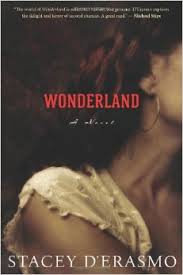In her fourth novel, Wonderland, Stacey D’Erasmo has crafted an immersive narrative about artistic creativity and freedom by honoring a basic unknowingness about the subject. She succeeds through the tonal control of her candid and shrewd narrator: Anna Brundage, a 44-year old rock star revered by cultish fans but just now emerging from a seven-year musical silence. Beginning at Copenhagen, the first stop of a European tour intended to revive her career, she keeps a notebook with the word “Wonderland” on its cover, the title of her new album.
 Anxiety and puzzlement are obsessional matters for a committed but stalled artist like Anna, but her narrative isn’t an impromptu monologue nor does its shape and sound strictly employ a notebook’s caprice, allusiveness, lyricism or disregard for linearity. The wonder of Wonderland is D’Erasmo’s ability to suggest unconventional, unresolved and speculative feelings and thoughts through language and structure that are actually quite commercially novelistic. She wants it both ways, and she pulls it off brilliantly.
Anxiety and puzzlement are obsessional matters for a committed but stalled artist like Anna, but her narrative isn’t an impromptu monologue nor does its shape and sound strictly employ a notebook’s caprice, allusiveness, lyricism or disregard for linearity. The wonder of Wonderland is D’Erasmo’s ability to suggest unconventional, unresolved and speculative feelings and thoughts through language and structure that are actually quite commercially novelistic. She wants it both ways, and she pulls it off brilliantly.
Offering diaristic self-exposure and intimacy, Anna trenchantly spells out her status for her listener:
“In my darker moments I feel like the queen of England, bound and gagged by reverence. Tin-crowned and irrelevant. Perhaps I should stay here in Christiana, take up my other life, pass through the hemp-scented membrane of this place and become another Anna Brundage, maybe a better one. An Anna on a distended, futuristic bicycle. Also, for yet another thing, this entire thing was along the lines of a disaster. Music is quicksilver, gossamer; careers are measured in butterfly lifetimes. My butterfly life ended seven years ago in Rome. No one gives a shit about what I do anymore. I’m on a tiny label, albeit it a tiny one with some cachet, but I paid for Wonderland myself.”
The forward motion of Wonderland tracks Anna’s multi-city concert schedule – travel, downtime or friction with band members, moments on stage, meet-ups with friends, sexual encounters. She says, “Tour time is different. It has no edges, no top, no bottom. It is a series of present moments. And if my voice goes, we’re all lost.” By bearing down on Anna’s attentive watch on “present moments” and establishing an engaging rhythm of prose-speech, D’Erasmo relies less on plot-driven action and more generously cultivates a sense of the density of experience.
 The tour motors on, but Anna’s psyche moves via reversions and mystifications. The narrative peers back at two nagging subjects. First, there is Anna’s father, a restless and iconoclastic sculptor notorious for splitting massive objects in two. His break-out project in 1972 entailed the dissection of a train. But a serious injury and an apparent ebbing of his creative drive marked his later years. Then, there is Anna’s longtime on-and-off lover Simon. The father’s long compulsion and shocking demise seem to prefigure Anna’s slump. The halting affair with Simon, whose features, attributes, and values are foreign, functions as an erotic archetype
The tour motors on, but Anna’s psyche moves via reversions and mystifications. The narrative peers back at two nagging subjects. First, there is Anna’s father, a restless and iconoclastic sculptor notorious for splitting massive objects in two. His break-out project in 1972 entailed the dissection of a train. But a serious injury and an apparent ebbing of his creative drive marked his later years. Then, there is Anna’s longtime on-and-off lover Simon. The father’s long compulsion and shocking demise seem to prefigure Anna’s slump. The halting affair with Simon, whose features, attributes, and values are foreign, functions as an erotic archetype
“Wonderland” is Anna’s own mind. On the one hand, she is candidly self-knowing; on the other, she is receptive to the erasing swoon of music and the body’s pleasures. She says, “Everything matters. Everyone matters. Think of me, if you like, as a person who can’t ignore the wave. A radio that is always on.” Anna’s narrative is a continuous exertion of establishing clarity. But at the same time, the succinctness of her observations and memories often gives way to wonder and a willingness to give up on answers.
The root of the telling is tangled in rue. Although Anna has recorded her albums according to her own standards, she is now trying to compensate for a blunder. Her third album was a botch: “It was my own fault, to be sure. I was the one who choked, and the price has been steep.” Anna is compelled to make tart assessments about her past – but she has too much artistic integrity to allow such clarities to define or limit or flavor her new music.
 One reviewer of Wonderland has remarked that D’Erasmo writes well about music. I don’t think so. In fact, she doesn’t write about music at all. In the following passage, she describes a moment on stage in Basel: “The sound fills the room like blood in our ears. The sound finds our pulse, the backs of our knees, the roots of our hair, our hearts, our lungs, the insides of our elbows. I can’t really read music, but I can find it with my hands, groping blind. I can pull down the notes I want from the air, like stealing fruit from someone else’s garden.” It makes sense that Anna can’t do better than to string together some tropes. Music, in the moment, is mysterious to her. But also, D’Erasmo knows the limits of her audience’s toleration – and tests (and flatters) it, carefully. “That’s what the smart people heard, whether they were conscious of it or not: my awareness that I was reaching for what I couldn’t quite grasp, the space just beyond my fingertips.”
One reviewer of Wonderland has remarked that D’Erasmo writes well about music. I don’t think so. In fact, she doesn’t write about music at all. In the following passage, she describes a moment on stage in Basel: “The sound fills the room like blood in our ears. The sound finds our pulse, the backs of our knees, the roots of our hair, our hearts, our lungs, the insides of our elbows. I can’t really read music, but I can find it with my hands, groping blind. I can pull down the notes I want from the air, like stealing fruit from someone else’s garden.” It makes sense that Anna can’t do better than to string together some tropes. Music, in the moment, is mysterious to her. But also, D’Erasmo knows the limits of her audience’s toleration – and tests (and flatters) it, carefully. “That’s what the smart people heard, whether they were conscious of it or not: my awareness that I was reaching for what I couldn’t quite grasp, the space just beyond my fingertips.”
Wonderland is filled with acutely perceived moments. In one chapter, Anna recalls visiting the Orangerie with her father and listening to his disapproval of Monet’s water lilies. Tellingly, one of the longest descriptive passages in the chapter is Anna’s self-portrait: “By then, I towered over my crooked father; my red hair cascaded in an electrocuted free-for-all nearly to my ass; I was too thin, which made my jaw look larger, my eye sockets prominent. Men looked at me in the street, then looked again, unsure of what they were seeing: babe or freak? … I knew what they saw – that odd knowingness in my expression. I had seen it in the mirror myself …”
That odd knowingness is the heart of Wonderland — a dominant trait that grows in poignancy the further Anna Brundage considers the forces, influences, relationships and pleasures that deliver her to a modest and fugitive wisdom.
[Published by Houghton Mifflin Harcourt on May 6, 2014. 256 pages, $22..00 hardcover]